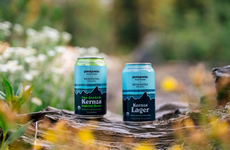
The Guinness Regenerative Agriculture Program is Ambitious
Michael Hemsworth — February 26, 2022 — Eco
The Guinness regenerative agriculture program is being launched by the Diageo-owned brand as a three-year endeavor that will see it taking a decidedly more sustainable approach to farming barley for its beverages.
The program will take place in Ireland where at least 40 farms will be involved when it comes to both spring and winter barley sowing. The program is expected to help improve soil health, while also enhancing biodiversity, carbon sequestration potential, reducing synthetic fertilizer use, improving water quality, enriching farmer likelihoods and more.
President of Diageo Europe John Kennedy commented on the Guinness regenerative agriculture program saying, "This pilot is the first such programme being implemented by Diageo, and the outcomes will help inform other potential opportunities, not just in Ireland, but in other countries where we source raw materials."
The program will take place in Ireland where at least 40 farms will be involved when it comes to both spring and winter barley sowing. The program is expected to help improve soil health, while also enhancing biodiversity, carbon sequestration potential, reducing synthetic fertilizer use, improving water quality, enriching farmer likelihoods and more.
President of Diageo Europe John Kennedy commented on the Guinness regenerative agriculture program saying, "This pilot is the first such programme being implemented by Diageo, and the outcomes will help inform other potential opportunities, not just in Ireland, but in other countries where we source raw materials."
Trend Themes
1. Regenerative Agriculture - The trend for using regenerative agricultural practices is growing as more companies recognize its potential to enhance biodiversity, improve soil health, and mitigate climate change.
2. Sustainable Farming - The trend for sustainable farming practices is gaining momentum as companies recognize the value of ethical and eco-friendly practices to meet growing demand for environmentally friendly products.
3. Biodiversity Conservation - The growing trend for preserving biodiversity is creating opportunities for companies to implement sustainable practices, protect ecosystems, and enhance the resilience of food production systems.
Industry Implications
1. Brewing Industry - The brewing industry can take advantage of regenerative agriculture practices to create more sustainable supply chains and enhance the environmental performance of their products.
2. Agriculture Industry - The agriculture industry has the opportunity to adopt regenerative practices to promote soil health, reduce carbon emissions, and ensure long-term sustainability of food production systems.
3. Food and Beverage Industry - The food and beverage industry can leverage regenerative agriculture practices to offer more sustainable and healthier products, while also meeting growing consumer demand for environmentally friendly products.
3.5
Score
Popularity
Activity
Freshness























